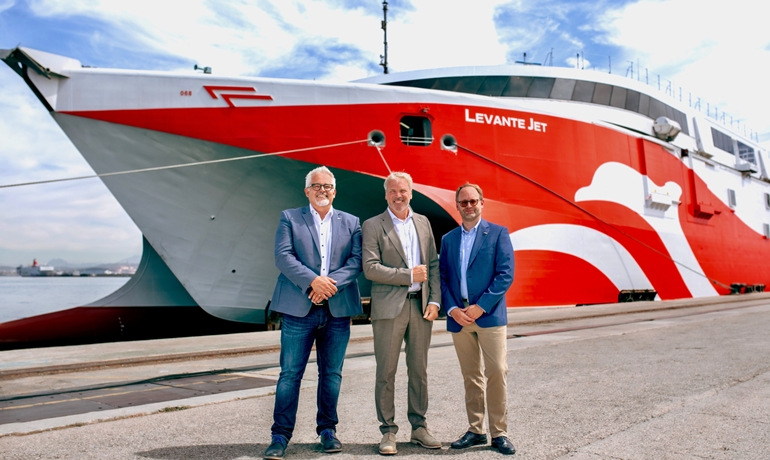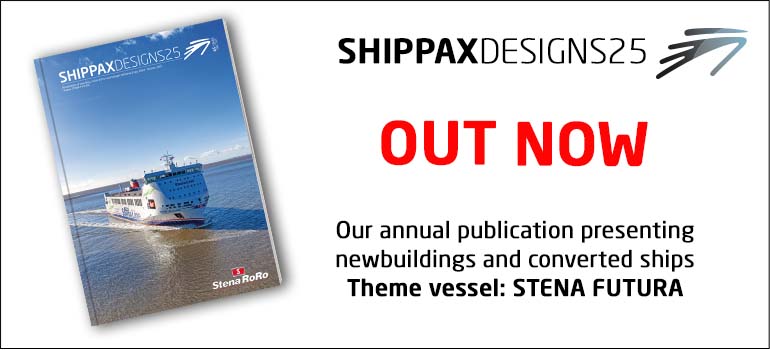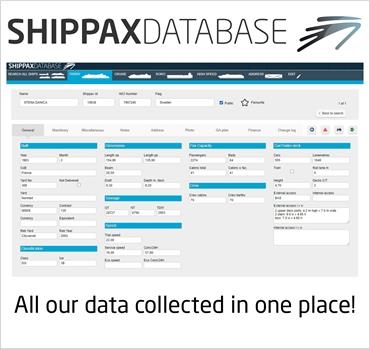
Ronny Moriana (MD FRS Iberia), Götz Becker (CEO FRS) and Tim Gädecken (MD FRS Iberia) in Front of LEVANTE JET © FRS
FRS sells subsidiary FRS Iberia to DFDS
DFDS has entered into an agreement to acquire FRS Iberia/Maroc, a division of the German short-sea ferry company FRS GmbH & Co. KG. FRS Iberia/Maroc operates three short-sea ferry routes across the Strait of Gibraltar connecting Spain and Morocco.
“We are excited to expand our network to one of Europe’s significant ferry markets that we expect will continue to show high growth underpinned by the ongoing nearshoring of supply chains to Europe”, says Torben Carlsen, CEO of DFDS.
“This is a great opportunity to scale DFDS’ business model. We will apply our capabilities and experience, not least from the Channel short-sea market, to further develop the Strait of Gibraltar ferry infrastructure while supporting regional tourism and trade”, says Mathieu Girardin, Head of DFDS’ Ferry Division and EVP.
“FRS Iberia/Maroc has achieved great success for more than two decades. We are pleased to have found a partner in DFDS who will run the company in a proven manner to ensure its continued growth and take good care of our employees”, says Götz Becker, CEO FRS Group.
Following the devastating earthquake in Morocco, the FRS Group has offered Moroccan authorities to assist with the transport of emergency supplies, medicine, and other emergency relief equipment. DFDS commends and fully supports these efforts while we through diplomatic representatives will explore possibilities for providing further assistance.
Strategic fit
The acquisition is aligned with DFDS’ strategy to develop and expand the transport network focused on moving goods in trailers by ferry, road & rail as well as moving passengers.
The acquisition expands DFDS’ Mediterranean route network that today connects Europe with Türkiye and Tunisia, respectively. The region’s organic market growth is expected to continue to exceed growth levels in northern Europe underpinned by nearshoring of manufacturing supply chains closer to end markets in Europe.
The integration of FRS Iberia/Maroc is expected to bring operating benefits, including tonnage allocation and benefits from application of business model insights from existing freight ferry routes and the combined freight and passenger Channel short-sea routes.
FRS Iberia/Maroc will be integrated in the Ferry Division. Expected synergies and integration plans will be disclosed in connection with the closing of the transaction.
Management
FRS Iberia’s current top management team consisting of Ronny Moriana Glindemann and Tim Gädecken will join DFDS and continue to manage the company post-closing.
About FRS Iberia/Maroc
FRS Iberia/Maroc operates three short-sea ferry routes across the Strait of Gibraltar: Algeciras-Tanger Med, Algeciras-Ceuta, and Tarifa-Tanger Ville. In 2023, a total of 2.3m freight lane metres, 1.9m passengers, and 370,000 cars are expected to be transported. Seven vessels with an average age of 23 years are deployed on the routes. The company is headquartered in Tarifa in Spain and started operations in 2000.
FRS Iberia/Maroc’s key expected financials for 2023 are revenues of DKK 1.0-1.2bn, EBITDA-margin of 18-20%, and EBIT-margin of 11-12%.
The largest route Algeciras-Tanger Med connects the largest industrial ports of Spain and Morocco. Revenue is equally split between freight and passengers. The route deploys two owned combined freight and passenger ferries (ro-pax) and one chartered/shared freight ferry (ro-ro). The route crossing time is 90 min.
Freight customers comprise both regional and pan-European freight forwarders and hauliers. Key Moroccan industry export sectors are automotive, textile, and fruit/vegetables.
The route between the ports of Tarifa and Tanger Ville is focused on tourism and transports foot and car passengers with a crossing time of 60 min. The route deploys two catamaran ferries, all owned.
The Algeciras-Ceuta route predominantly transports foot and car passengers as well as accompanied freight trailers. The route deploys two catamaran ferries, one owned and one chartered. The route crossing time is 60 min.
The total Strait of Gibraltar freight market is expected in 2023 to grow to around 475,000 units (trucks and trailers). The total passenger market is expected to increase to around 6m passengers while the number of cars is expected to reach 1.2m. FRS Iberia’s market share is 28-30% depending on segment. All three segments are expected to grow 5-10% annually for the next three years.
Ferry operations in the Strait of Gibraltar are subject to both Spanish and Moroccan regulations, including with respect to port access and licenses. Certain routes are subject to requirements for number of departures and vessel capacity.
Morocco’s GDP is expected to continue to grow in the coming years underpinned by its role as a manufacturing hub for Europe. Nearshoring of supply chains is also expected to benefit Morocco’s export growth. Europe is Morocco’s leading destination for exports, including Spain that accounts for around 23% of Morocco’s export.
Transaction structure and financing
DFDS acquires FRS Iberia/Maroc for a debt-free price equal to an EV/EBITDA multiple of 6x based on expected EBITDA for 2023. The transaction will be financed by a combination of loan financing and use of existing cash funds.
The transaction is expected to increase DFDS’ financial leverage, NIBD/EBITDA, by 0.1x on a pro forma basis.
The transaction is expected to be ROIC accretive vs the current return level and to be accretive to earnings per share (EPS) from closing.
Closing of the transaction is subject to regulatory approval, including merger control clearance in both Spain and Morocco.
Outlook 2023 impact
The transaction is not expected to have a material impact on DFDS’ revenue or earnings in 2023 as the transaction is expected to close at the end of 2023.
© Shippax
sep 17 2023


















